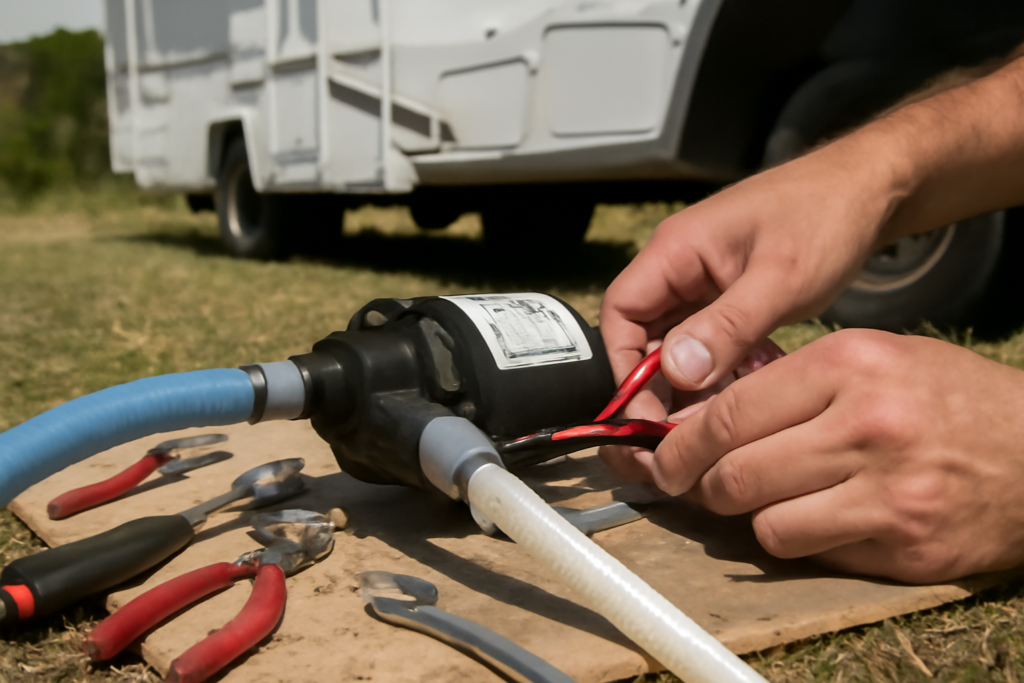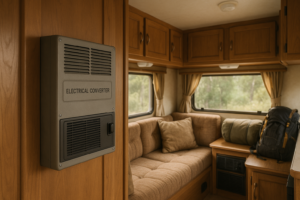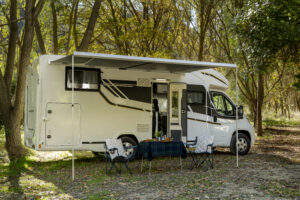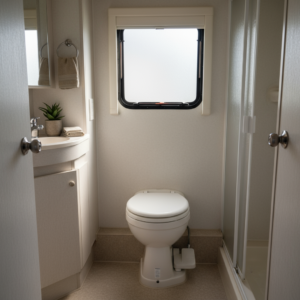
RV Water Pump Troubleshooting: Step-by-Step Fixes for Common Issues
Table of Contents
Your RV’s water pump is the heart of its freshwater system—responsible for delivering pressurized water from the tank to your faucets, shower, and toilet whenever you’re off the grid. When it stops working or starts acting up, it can quickly disrupt daily routines and cut a trip short. Whether your RV water pump won’t turn on, keeps cycling, or delivers low water pressure, this guide will walk you through common issues and practical troubleshooting steps. No matter where you’re parked—on the road, at a campground, or in your driveway—you’ll be equipped to diagnose and fix RV water pump problems quickly and confidently.
Why RV Water Pump Issues Happen
Like many components in an RV, the water pump undergoes regular wear and tear—especially if you travel frequently or live in your rig full-time. These 12V pumps are built for durability, but they’re not immune to problems. Over time, internal parts can degrade, filters may clog, and seals can loosen, leading to RV water pump issues ranging from low pressure to complete failure.
Inconsistent use and seasonal storage can also take a toll. For example, storing your RV without fully winterizing it can cause trapped water to freeze and crack pump components. Similarly, infrequent operation can allow debris or mineral buildup to restrict flow or prevent the pump from priming properly.
Poor maintenance habits—such as ignoring routine filter cleaning or failing to check for small leaks—can allow minor issues to snowball into bigger problems. Even something as simple as letting the freshwater tank run dry can lead to airlocks or a pump that runs continuously without pressurizing the system.
Understanding these common causes is the first step in effective RV water pump troubleshooting, helping you catch problems early and avoid being stranded without running water.
Common Signs Your RV Water Pump Isn’t Working Properly
When your RV water pump starts malfunctioning, it usually doesn’t fail without warning. Recognizing the early symptoms can save you from a complete breakdown and costly repairs. Here are some of the most common RV water pump problems to watch for:
1. No water flow at the faucet
If you turn on a tap and no water comes out, it may mean your RV water pump won’t turn on, isn’t primed, or is unable to pressurize the system.
2. Low or inconsistent water pressure
Weak flow from your shower or sink often points to a partially clogged filter, airlock in the line, or a worn-out pump diaphragm.
3. Pump runs continuously without shutting off
A properly functioning RV water pump should cycle off once pressure builds. If it runs non-stop, there may be a hidden leak, a faulty check valve, or the system is struggling to reach target pressure. This can also be caused by the winterizing diverter being set to winterize.
4. Pump makes loud or unusual noises
Grinding, vibrating, or humming noises could indicate trapped air, loose mounting hardware, or internal wear. RV water pump noise troubleshooting can often reveal minor issues before they worsen.
5. Pump turns on without water demand
If your pump cycles on and off when no water is being used, it might be compensating for a slow leak or pressure drop in the plumbing system. This can also be caused by a faulty check valve on the pump, usually debris in the check valve.
Spotting these signs early allows you to begin targeted RV water pump troubleshooting and address issues before they escalate—keeping your water system reliable no matter where you’re parked.
Step-by-Step Troubleshooting Guide
If your RV water pump isn’t working properly, this step-by-step guide will help you diagnose the issue and apply a targeted fix. From no power to strange noises, each problem has specific causes and easy-to-follow solutions. Here’s how to troubleshoot your RV water system efficiently:
1. Pump Doesn’t Turn On
Possible Causes:
- Blown fuse or tripped breaker
- Loose or corroded wiring
- Faulty power switch or bad ground connection
- Loose plugs on the pressure switch
Fixes:
- Locate the fuse box and check the pump fuse—replace if blown
- Inspect the wiring harness and tighten or clean any loose connections
- Test the 12V switch for continuity and replace if needed
If the RV water pump won’t turn on at all, always verify there’s power reaching the pump using a multimeter before assuming it’s failed.
2. Pump Runs but No Water Comes Out
Possible Causes:
- Most common cause on newer units is the winterizing diverter being set to winterize
- Airlock in the lines
- Dry or nearly empty freshwater tank
- Clogged pump strainer or inline filter
Fixes:
- Prime the pump by running water through the inlet manually or using a siphon method
- Check the freshwater tank level—refill if low or empty
- Remove and clean the strainer or any inline filters
This is a common RV water pump troubleshooting scenario after long storage periods or if the system ran dry.
3. Low or Inconsistent Water Pressure
Possible Causes:
- Partially blocked water lines or faucet aerators
- Worn or damaged pump diaphragm
- Small leaks in the plumbing or fittings
Fixes:
- Clean all faucet aerators and clear out any debris in the lines
- Inspect the pump’s internal diaphragm (if accessible) and replace if worn
- Check under sinks and around joints for water leaks—tighten fittings as needed
Poor water pressure can also result from using the wrong type of pump or one that’s underpowered for your RV’s needs.
4. Pump Runs Continuously
Possible Causes:
- Pressure is not building due to a small leak or open valve
- Faulty check valve allowing backflow
- Cracked hose or loose connection
Fixes:
- Turn off all faucets and listen for hissing or dripping—locate and fix any leaks
- Check for loose fittings, especially at the pump inlet/outlet
- Test and replace the internal check valve if necessary
A RV water pump running non-stop is often a sign of a pressure loss that the system is trying to compensate for.
5. Loud or Unusual Noises
Possible Causes:
- Air trapped in the plumbing lines
- Pump not securely mounted
- Worn bearings or pump motor failure
Fixes:
- Open all faucets and flush the system to purge air
- Tighten or remount the pump using rubber grommets to reduce vibration
- If noise persists, consider replacing the pump, especially if it’s older or has seen heavy use
RV water pump making noise doesn’t always mean failure—but it should never be ignored.
Maintenance Tips to Prevent RV Water Pump Problems
Preventive care is the key to avoiding unexpected RV water pump issues on the road. A little routine maintenance goes a long way in extending the lifespan of your pump and ensuring consistent water pressure throughout your travels. Here are practical tips to keep your RV’s water system running smoothly:
1. Flush and sanitize the water system regularly
Bacteria and mineral deposits can build up over time, clogging the pump or filters. Clean your RV freshwater system every few months, especially before and after long trips or storage.
2. Run the water pump periodically during storage
Letting the pump sit idle for months can lead to stuck valves or dried-out seals. Power it on occasionally—even when parked—to keep internal components in working order.
3. Check and clean the pump strainer
Most RV water pumps have a built-in strainer to trap debris. A dirty or clogged strainer can reduce water flow or cause the RV water pump to cycle frequently.
4. Inspect for leaks and loose fittings
Water leaks reduce pressure and may cause the pump to run continuously. Look around faucets, hose connections, and the pump itself for any signs of moisture or corrosion.
5. Never let the fresh water tank run dry
Running the pump without water can cause airlocks or overheat the motor. Refill your tank before it gets too low to avoid unnecessary strain on the system.
6. Winterize your RV properly
Freezing temperatures can crack hoses, filters, and pump components. Use RV antifreeze and drain lines thoroughly before storing your vehicle in cold weather.
By following these basic maintenance steps, you can minimize the need for RV water pump troubleshooting and enjoy more reliable performance—wherever the road takes you.
When to Call a Professional RV Technician
While many RV water pump troubleshooting tasks can be handled by RV owners, some problems require the skill and tools of a certified technician—especially when safety, complex repairs, or electrical systems are involved.
Consider calling a professional if:
The pump still doesn’t work after basic troubleshooting
If you’ve checked power, primed the system, and inspected for clogs or leaks—but your RV water pump still won’t turn on or function properly—it may point to a deeper electrical issue or internal motor failure.
There’s visible damage to wiring or components
Exposed wires, burnt smells, or signs of corrosion can pose a serious risk. Handling electrical components without proper knowledge may lead to further damage or injury.
Water is leaking from the pump housing
Cracks in the pump body, damaged seals, or pressurized leaks often require part replacement or a complete RV water pump repair—best done with the right tools and experience.
The system shows signs of plumbing failure
If troubleshooting reveals widespread plumbing issues, like low pressure in all outlets, consistent backflow, or noisy vibrations even after bleeding the lines, it’s time to involve a technician.
You're not confident making the repairs yourself
Misdiagnosing a problem can lead to wasted time, extra cost, or even water damage. A mobile RV technician can quickly pinpoint the issue and get your system running reliably.
For full peace of mind, schedule a mobile RV water system checkup if you’re preparing for a long trip, especially if your pump has shown signs of wear.
Need expert help? Book our mobile RV water pump repair service and we’ll come directly to your location—no towing, no hassle.
Final Thoughts
Your RV’s water pump plays a vital role in delivering comfort and convenience on the road. From morning showers to cooking and cleaning, it keeps your water system running smoothly—until something goes wrong. By understanding the most common RV water pump problems, recognizing early warning signs, and following a structured troubleshooting guide, you can often fix issues before they escalate.
Routine maintenance, such as cleaning filters, checking for leaks, and properly winterizing your system, goes a long way in preventing costly breakdowns. But if your RV water pump won’t turn on, continues to run without building pressure, or makes strange noises despite your best efforts, it may be time to call a professional.
Whether you’re gearing up for a long road trip or just parked at your favorite campsite, staying proactive with your RV water pump maintenance ensures you won’t be caught off guard when you need water the most.
Need expert help? Our mobile RV repair team is ready to bring reliable, on-site service wherever your journey takes you.
Frequently Asked Questions (FAQs)
How do I reset my RV water pump?
Most RV water pumps don’t have a dedicated reset button. To reset the system, turn off the pump using the control panel, check for blown fuses or tripped breakers, and then turn it back on. If issues persist, continue with RV water pump troubleshooting to identify the root cause.
Can I run my RV water pump while connected to city water?
No. When you’re hooked up to a city water connection, the onboard water pump should be turned off. Running both can lead to pressure buildup and may damage the RV water system.
Why does my RV water pump run continuously?
A pump that doesn’t shut off usually indicates a pressure issue. This could be due to a hidden leak, a partially open faucet, air trapped in the lines, or a faulty check valve. Refer to the guide above for detailed steps to diagnose this problem.
How long do RV water pumps last?
With proper maintenance, most 12V RV water pumps last 4 to 8 years. Lifespan depends on usage, water quality, and how well the system is winterized and maintained.
Can a clogged filter cause low water pressure?
Yes. A clogged strainer or inline filter can restrict water flow, leading to weak or inconsistent pressure. Cleaning the filter is one of the first steps in any RV water pump troubleshooting process.


